The battle over space emissions in Cornwall
As the UK’s first rocket launch nears, space enthusiasts, climate activists, scientists and local residents are divided.

Listen to this story:
Newquay, England – Anything, not least a weather forecast, would suggest this is an ordinary festival in the United Kingdom’s most southwesterly county, Cornwall. Mizzle – a local word used to describe the marriage of mist and drizzle – descends on the crowd, creeping into hooded jackets, soaking through socks and fogging up sunglasses.
Keep reading
list of 4 itemsIs climate rebellion the future?
Climate Wars: Why is the US so divided about climate change?
The backyard astronomers turning stargazing into space portraits
But little can dampen the excitement of the patchwork of people gathered in a field, sporting t-shirts splashed with the words, “Earthling” “NASA” and “Apollo,” and, in one man’s case, an inflatable astronaut suit. By a central stage, children drip electric-blue ice creams while adults sip tangy cocktails, swaying under kaleidoscopic lights to the strains of a Pink Floyd tribute band.
Everyone here has something in common: They are serious fans of outer space. Enough to make the snaking journey down single-track country roads on a not-so-summery Saturday in July, to celebrate 60 years of the UK’s most iconic satellite station, Goonhilly.
In its heyday, the 160-acre (65-hectare) site was the world’s birthplace of satellite communications, with more than 60 dishes dedicated to computer data, fax transmissions, TV signals and telephone calls. But this November, the otherwise quiet county of Cornwall will become an even greater symbol of British space progress, as the region selected to launch the first rocket from home soil.
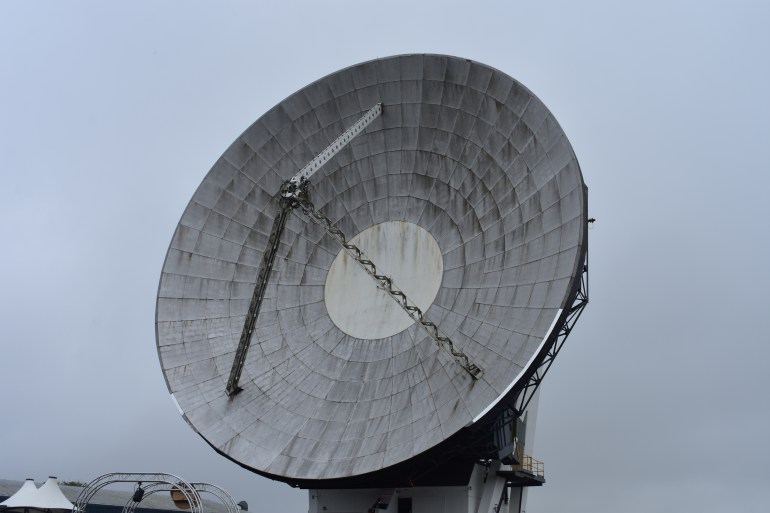
After eight years of preparation, Cornwall Council, the Goonhilly Earth Station, and Virgin Orbit – Richard Branson’s commercial satellite company – will send a rocket into earth’s lower orbit from Newquay airport, a small unassuming airport in the middle of the county.
The rocket, Launcher One, will take off from the new “Spaceport Cornwall” horizontally, carried under the wing of a modified passenger airliner named, Cosmic Girl. On board will be several shoe-box-sized satellites, which will be released at about 35,000 feet (10,668 metres) and blast into space.
Cornwall is one of a handful of spaceport sites, the designated areas where spacecraft can land and take off, that are scattered in rural corners of the UK, including an archipelago in Scotland and a mountain range in Wales. After decades of watching the superpowers – the United States, Russia and China – accelerate their space programmes, these satellite launches will mark the UK’s first strides into the space race.
Yet as space supporters welcome the launch, environmental activists see the emissions associated with the new spaceport as further damage to the planet. Those behind the spaceport, however, argue that the site will be carbon neutral – and ultimately, could help combat the climate crisis.
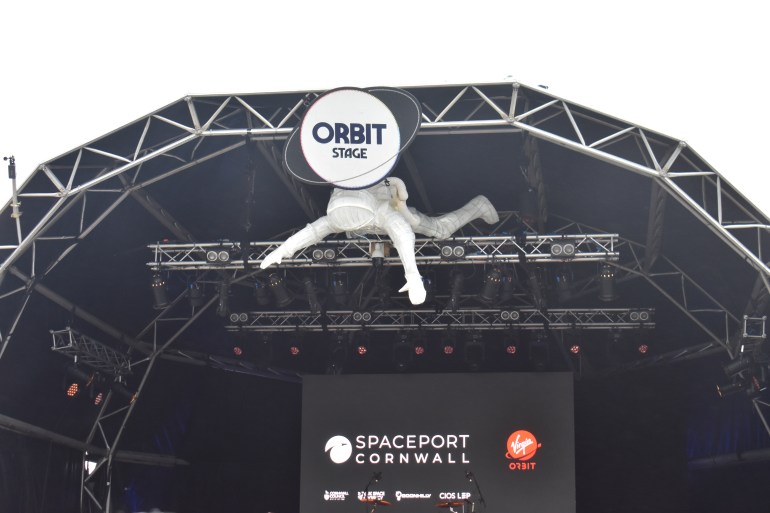
A long time coming
For enthusiasts at the Goonhilly festival, such as 50-year-old Simon Ould, the launch has been a long time coming.
“This is the last piece of the jigsaw that Britain hasn’t had,” he says, beaming against a backdrop of a space engineering exhibition. “We have the satellite building expertise and the research track record, but we haven’t had that last bit, the actual launch capability.”
Ould’s fascination with space is familiar to many at the festival – of a childhood staking out under inky black skies, tracing the constellations with his father. He went so far as to turn his space fantasy into a full-time job, and today, he runs a mobile planetarium, bringing the wonders of the galaxy into schools across the southwest of England.
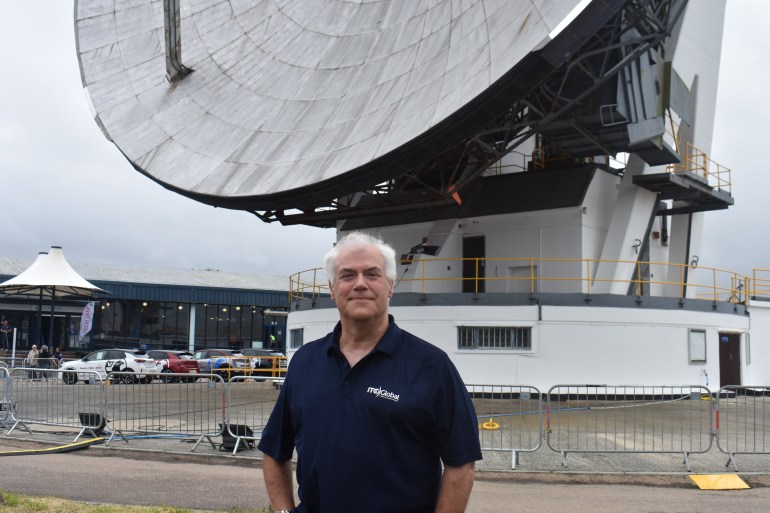
“My job is to engage young people in outer space, and hope that they will be inspired to look into high-tech careers,” he says. Ould’s own three children are following in his footsteps, studying robotics at university and showing a knack for science in high school. “And now, with this launch, they might well be migrating to Cornwall for work in the future,” he adds.
Simon Rodda, who started his career at Goonhilly as a young apprentice in 1982, is equally optimistic. Now, silver-haired and furrowed, an antenna looms behind the 56-year-old – 30 metres (98 feet) in diameter – that he was sent to climb up, legs shaking, as a starry-eyed teenager to learn the rigging.
Rodda, who still works in satellite communications for the Texas company, ITC Global, is effervescent with excitement about Cornwall’s space potential. “This is the best place to be and I wouldn’t miss it for the world.”

A ‘devastating blow’ to the environment
However, on another side of Cornwall, some 48 kilometres (30 miles) away in the countryside of St Austell, the spirit is far less celebratory.
Nichola Andersen and Oliver Baines – two full-time climate activists who launched a petition in 2019 against Spaceport Cornwall – called the project a “devastating blow” to the environment.
“We need to stop ecological disaster here on this planet, not hasten its death by launching rockets into space,” says Andersen.
She and Baines live in a leafy valley that is every inch the rural idyll: chickens potter around a coop, golden hay barrels punctuate a grassy field and a rustic iron wheel pokes out from the banks of a brook. Every so often a train rattles over a Victorian viaduct in the distance, momentarily disrupting the quiet.
“I’m not against space. The people who have been campaigning against the spaceport have been called Luddites and anti-technology. People say we just want to go back to living in caves. But technology isn’t going to save us,” Andersen adds.
For climate activists, the argument is frustratingly simple. In a world that should be striving towards net zero, launching satellites into space is a reckless use of emissions.
In Cornwall, the controversy hits close to home. In 2019, Cornwall Council was one of the first local authorities in the UK to declare a climate emergency, setting ambitious climate targets in a bid to become carbon neutral by 2030. Yet, just a few months later, the Council voted 66 to 34 to help get Spaceport Cornwall off the ground, by giving it a key capital funding grant.
Environmental protesters, though, cite an emerging body of research that suggests emissions from rockets can lead to a particularly harmful heating effect in the upper layers of the atmosphere.
A recent report from University College London (UCL), the University of Cambridge and the Massachusetts Institute of Technology concluded that rocket launches have a far more detrimental effect on the planet than the aircraft industry, as pollutants get trapped in the stratospheric ozone and catch heat from the sun.
“The team found that black carbon [soot] particles emitted by rockets are almost 500 times more efficient at holding heat in the atmosphere than all other sources of soot combined [surface and aircraft] – resulting in an enhanced climate effect,” the report said.
Although the current loss of total ozone due to rockets is small, the study suggested that this will only increase as satellite launches and space tourism takes off. There could be as many as 17,000 satellites launched in the next 10 years – a fourfold increase during the past decade – according to forecasts in the sector.
Eloise Marais, an associate professor in physical geography at UCL, and co-author of the research paper, also suggested that space debris – the objects humans leave behind in space – needs urgent consideration.
Currently, low-orbiting satellites have relatively short life cycles, and the status quo is to de-orbit satellites that are no longer in use.
“In the burning process, byproducts of nitrogen oxides are produced, and also the materials that these satellites are composed of produce chemicals, like alumina oxide from aluminium. These also contribute to the depletion of ozone in the stratosphere,” she told Al Jazeera.
Marais warned that humans will have to make a “cost-benefit analysis” when considering the environmental impact in space. “There have to be tough decisions made, we need to be more careful about considering what we put into space, by prioritising things that society most critically needs,” she said.

Scant regulation in space
Yet regulation in space is still relatively scarce, as demonstrated in July 2022, when China was condemned for letting a rocket booster fall, uncontrolled, to Earth. In fact, the loose “constitution” governing space exploration dates back to 1967, when the Outer Space Treaty was drawn up during the Cold War.
Worldwide, environmental campaigners are putting pressure on politicians to hold back on spaceports. Andersen and Baines have connected with protesters in other regions with proposed satellite launches, including those in Georgia, in the US and the Scottish Highlands.
However, in Cornwall, the stakes are different, as Spaceport Cornwall is funded by a 10 million pound ($11.8 million) package of taxpayers’ money.
“It’s rubbing salt in the wound to have Richard Branson gleefully all over our papers, telling us what a brilliant job he’s done with launching his satellites in Cornwall with our money,” Andersen says.
However, Virgin Orbit has insisted the mission will achieve “milestones across multiple fronts”.
In a public statement, Mark Baird, the president of Virgin Orbit National Systems, said the launch marked “a mutual commitment to delivering the full value of space access for all” especially those from “non-traditional locations”.
For Andersen, the spaceport is a “vanity project” in a region where rates of rural deprivation are some of the highest in the UK, and which, until recently, received European Union funding in recognition of severe social inequality.
The Cornwall Council maintains that it takes its climate responsibilities “seriously” and has been clear that the spaceport must achieve carbon neutrality by 2030.
Louis Gardner, the Council’s cabinet portfolio holder for economy, told Al Jazeera, “Spaceport Cornwall is about investing in our future. The economic benefits and environmental impact have been at the heart of our decision to lead on this project.”
He added that the project could diversify the local economy and bring more revenue and 150 direct jobs by 2025.
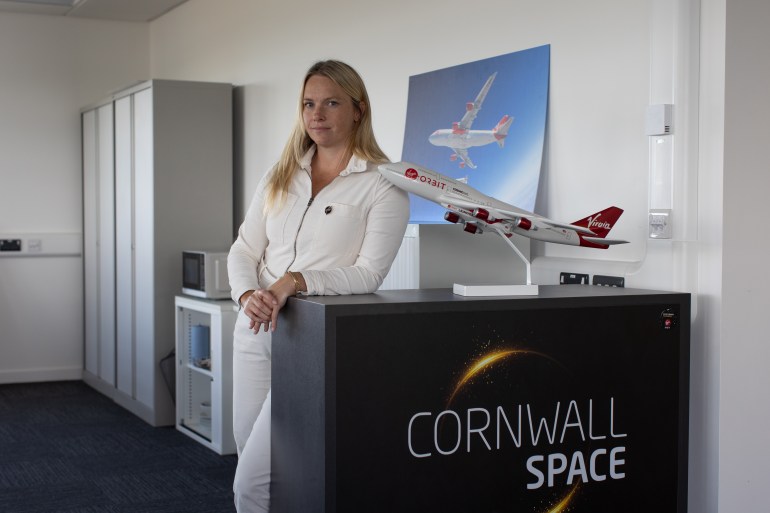
Promises of a sustainable spaceport
Yet for all the environmental controversy and space festival fanfare, arriving at Spaceport Cornwall headquarters on the outskirts of Newquay, Cornwall, in August is a muted affair. Barbed-wire fencing shuts out rambling fields with just a hint of sea on the horizon, while the airfield itself lies deserted. Cosmic Girl’s hangar is empty, giving no sign that the launch of a lifetime will take place in a few months’ time.
But Cornwall Airport Newquay was selected because of its practical advantages, not its reputation as a booming airport. Home to one of the longest runways in the UK, at 2,744 metres (9,003 ft), it boasts uncongested airspace and close proximity to the Atlantic Ocean.
And it will become the world’s most sustainable spaceport, promises the 38-year-old CEO of Spaceport Cornwall, Melissa Thorpe. The world’s first female director of a spaceport, she leads a tour in a tailored white jumpsuit, accessorised with a black badge embossed with the company’s logo – the outline of a rocket and swirling trail. Her Canadian accent stands out among the local lilt, although she has called Cornwall home for 12 years.
Thorpe says Spaceport Cornwall aims to become a carbon neutral operation by 2030, by offsetting emissions through strict sustainability targets. She insists that building a spaceport on an existing airfield is more sustainable than creating one from scratch, and launching satellites from the UK, where many devices are already manufactured, saves on transport emissions to other countries.
In July, Spaceport Cornwall commissioned a carbon impact assessment from the University of Exeter, which studied the lifecycle greenhouse gas emissions of proposed satellite launches between 2022 and 2027. The study concluded that these would amount to 0.057 percent (in 2022) and 0.071 percent (from 2023 onwards) of total territorial greenhouse gas emissions for Cornwall and the Isles of Scilly.
In comparison, Cornwall’s road transport and housing emissions took up 45 percent of the county’s carbon total when a survey was last taken in 2016.
Thorpe patiently breaks down the climate-space nexus she has fielded numerous times before.
“We were totally naive in thinking that people understood why space and satellites were part of the solution,” she explains.
“Most people don’t understand why space is important, but 50 percent of our climate data comes from space, and I have environmentalists sitting there, using space technology, to tell me how much they hate space,” she says.
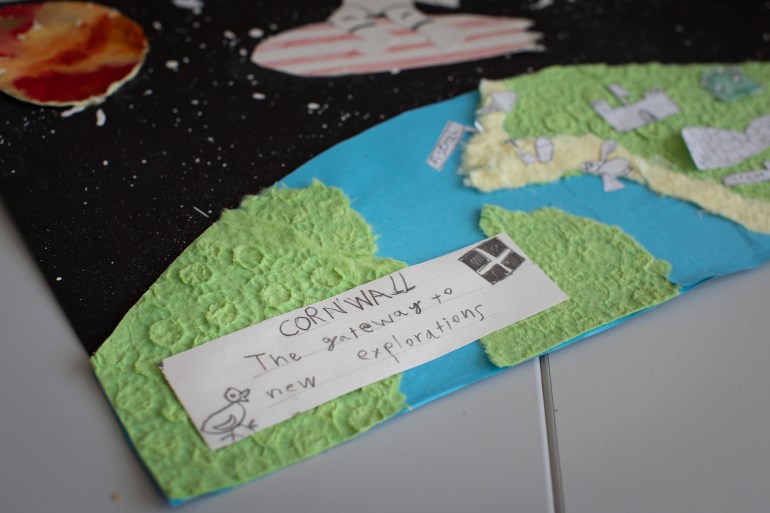
‘Nature-based solutions’
Ian Hendy, a marine conservationist from the University of Plymouth who is working with Spaceport Cornwall, went further, arguing that these launches can inspire “nature-based solutions”.
One of the first satellites to be dispatched in November is Kernow Sat 1 – a nod to the ancient name for Cornwall as well as its geography, with its 697km (422 miles) of coastline. Its mission will be to map ocean health, in order to troubleshoot problems such as ocean acidification, coastal erosion and marine habitat loss.
“The data that is collected remotely from the sensors will get pinged up to Kernow Sat 1, which we can download in real time to monitor those ecosystems,” Hendy told Al Jazeera. “Then, we can do the active boots on the ground restoration, to bring back these carbon-rich ecosystems that act as the lungs of the planet.”
During the last few years, satellites have been used to uncover climate crimes from illegal fishing in the Pacific Ocean which harms marine ecosystems, to deforestation in Peru.
For Hendy, the environmental trade-off is worth it. “I would wager a bet that the carbon sequestered which can be stored and saved, far outweighs the carbon footprint of sending something to the atmosphere to look at it,” he said.
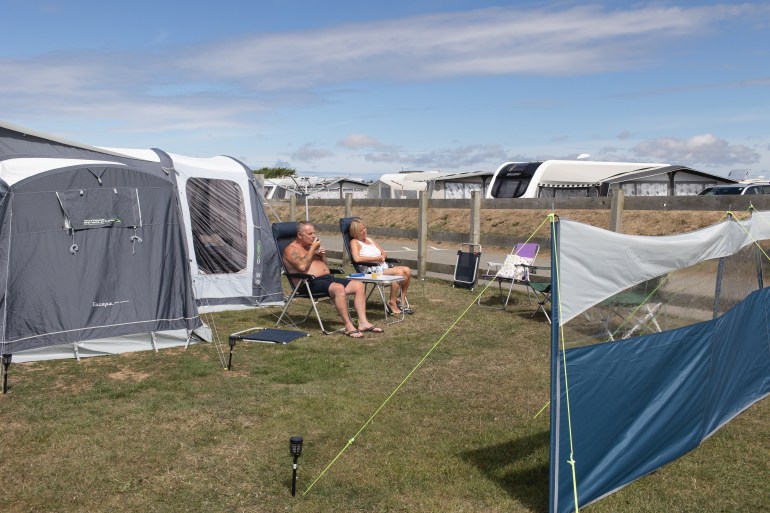
‘Really?’
But on the fringes of Newquay airport, in the sleepy village of St Mawgan, the mood is mixed. For residents living on the edge of the spaceport site, the argument doesn’t come down to innovative satellites versus space pollution. Residents are more concerned with crumbling public services and excessive noise.
“All of a sudden, it came over the news that St Mawgan was going to be a space hub and I thought, ‘Really’?” says John Phillips, who owns a popular holiday park under the flight path of the airport.
“There’s a lot of other things that need to be addressed like hospitals, the schools around here. I’m waiting for doctor’s appointments, my wife is waiting for appointments. It’s just not acceptable, if they’ve got the spare cash. They should be spending it on the infrastructure that’s already here,” he says.
At Hawkey’s café in the heart of town, the staff are taking a break from a morning of serving up full English breakfasts. The locals, ranging from their teens to their fifties, ponder the launch over giant mugs of tea.
“You’ll always get a few people who complain, but I’m on the flightpath for every plane that comes in and it doesn’t bother me,” says the cafe’s owner, Alan Sandleson.
“I’m really looking forward to the launch. I live at the top and I’ll be able to watch it from my lounge,” adds his colleague, Judy Cooper.
This November, they will join hundreds of people in the early hours of the morning, bleary-eyed with binoculars on hand, who will watch the red and white aircraft on its maiden voyage.
And as it shoots into the unknown, to join the glimmers of stars and orbiting satellites, few will be the wiser as to what cost – or benefit – this will have for the planet.